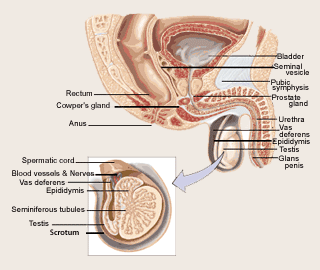What are the
Risk Factors for Testicular Cancer?
 A risk factor is anything that changes your
chance of getting a disease such as cancer. Different cancers have
different risk factors. For example, exposing skin to strong sunlight
is a risk factor for skin cancer. Smoking is a risk factor for many
cancers. But often, having a risk factor, or even several, does not
mean that you will get the disease. Just as having no risk factors
doesn't mean you won't get the disease.
A risk factor is anything that changes your
chance of getting a disease such as cancer. Different cancers have
different risk factors. For example, exposing skin to strong sunlight
is a risk factor for skin cancer. Smoking is a risk factor for many
cancers. But often, having a risk factor, or even several, does not
mean that you will get the disease. Just as having no risk factors
doesn't mean you won't get the disease.
Scientists have found few risk factors that make a man more likely to
develop testicular cancer. Even if a man has one or more risk factors
for this disease, it is impossible to know for sure how much that risk
factor contributes to developing the cancer. Also, most men with
testicular cancer do not have any of the known risk factors.
Undescended
testicle: One of the main risk factors for testicular cancer is
a condition called cryptorchidism, or undescended testicle(s). About
10% of cases of testicular cancer occur in men with a history of
cryptorchidism. Normally, the testicles develop inside the abdomen of
the fetus and they descend into the scrotum before birth. In about 3%
of boys, however, the testicles do not make it all the way down before
the child is born. Sometimes the testicle remains in the abdomen. In
other cases, the testicle starts to descend but remains stuck in the
groin area.
Most of the time, undescended testicles continue
moving down into the scrotum during the child's first year of life. If
the testicle has not descended by the time a child turns 1 year old, it
probably won't go down on its own. Sometimes a surgical procedure known
as orchiopexy is necessary to bring the testicle down into the scrotum
Men with a history of an undescended testicle have
an increased risk of testicular cancer. Some experts believe that the
risk of testicular cancer may be somewhat higher for men whose testicle
stayed in the abdomen as opposed to one that has descended at least
partway. Although most cancers develop in the undescended testicle, up
to 25% of cases occur in the normally descended testicle. Based on
these observations, some doctors conclude that cryptorchidism doesn't
actually cause testicular cancer but that there is something else that
leads to both testicular cancer and abnormal positioning of one or both
testicles.
There is some evidence that orchiopexy done when a
child is younger can reduce the risk of his developing certain types of
germ cell tumors. The best time to do this surgery to reduce the risk
of testicular cancer is not clear. Experts in the United States
recommend that orchiopexy be done soon after the child's first birthday
for reasons (such as fertility) that are not related to cancer. A
recent large study showed that those who had this surgery after the age
of 12 were more likely to get testicular cancer than those who had
orchiopexy at an earlier age.
Family history:
A family history of testicular cancer increases the risk. If a man has
the disease, there is an increased risk that one or more of his
brothers or sons will also develop it. However, only about 3% of
testicular cancer cases are actually found to occur in families, so
that most men are unlikely to pass this disorder on to their children.
HIV infection:
Some evidence has shown that men infected with the human
immunodeficiency virus (HIV), particularly those with AIDS, are at
increased risk. No other infections have been shown to increase
testicular cancer risk.
Carcinoma in
situ: This condition does not produce a mass or cause any
symptoms. It isn't clear how often carcinoma in situ (CIS) in the
testicles progresses to cancer. In some cases, CIS is found in men who
have a testicular biopsy when they have a medical evaluation of
infertility or have a testicle removed because of cryptorchidism.
Doctors in Europe are more likely than the doctors in this country to
look for (and treat) CIS. This may be why the figures for diagnosis and
progression to cancer are lower in the United States than in parts of
Europe.
Cancer of the
other testicle: A history of testicular cancer is another risk
factor. About 3% or 4% of men who have been cured of cancer in one
testicle will eventually develop cancer in the other testicle.
Age:
Ninety percent of testicular cancers occur between the ages of 20 and
54. But this cancer can affect males of any age, including infants and
elderly men.
Race and
ethnicity: The risk of testicular cancer among white men is
about 5 times that of black men and more than 3 times that of
Asian-American and American Indian men. The risk for Hispanics/Latinos
falls between that of Asians and non-Hispanic/Latino whites. The reason
for these differences is not known. Worldwide, the risk of developing
this disease is highest among men living in the United States and
Europe and lowest among men living in Africa or Asia.
Body size:
Some studies have found that the risk of testicular cancer is somewhat
higher in tall men but other studies have not.
By the American Cancer Society®
